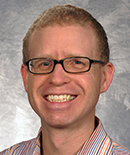The Cancer Moonshot: ATS = Mission Control for Lung Cancer (B3)
9:15-11:15 a.m.
Monday
Marquis Ballroom 6 (Level M2), Marriott Marquis Washington
The Cancer Moonshot aims to conquer cancer, and the American Thoracic Society aims to guide the battle against lung cancer.
“Pulmonologists are oftentimes the front door for patients with lung cancer,” says Christopher Slatore, MD, associate professor of medicine at Oregon Health & Science University and co-leader of the Lung Cancer Screening Clinical Demonstration Project at the VA Portland Health Care System. “The Cancer Moonshot represents a huge opportunity for cancer research as a whole—and especially for the ATS—to take the lead in lung cancer. The reality is, if you actually want to make a big dent in overall mortality, you have to figure out how to do it for lung cancer.”

Christopher Slatore, MD
Lung cancer takes more lives than breast, prostate, and colon cancers combined, accounting for nearly 30 percent of all cancer deaths. Recognizing the importance of the ATS and pulmonologists in lung cancer research and treatment, Dr. Slatore helped organize a symposium to examine the project. Douglas Lowy, MD, acting director of the National Cancer Institute and head of the Cancer Moonshot project, will open the symposium.
“Having Dr. Lowy to set up the Cancer Moonshot and the role the ATS can play in guiding the lung cancer effort underscores the importance of this session,” Dr. Slatore says. “In keeping with our theme in Washington, DC, the Moonshot is one of the few things that Democrats and Republicans have agreed on recently to fund and get moving. This is a vital program for the country, for NCI, for us, and for our patients. Lung cancer is the leading cause of cancer death in the United States and claims more victims than the next three cancers combined.”
ATS members are key players in three vital areas in lung cancer: prevention and screening, nodules and early detection, and novel therapies to treat early stage disease.
Pulmonologists already play a leading role in lung cancer prevention and are at the front line in lung cancer screening programs.
Michael K. Gould, MD, MS, director of Health Services Research & Implementation Science at Kaiser-Permanente Southern California, will discuss the first randomized trial on pulmonary nodule surveillance. Millions of patients are diagnosed with pulmonary modules every year, Dr. Slatore notes, and recommendations for active surveillance are currently based on expert opinion.
“This is the first time we are going to have randomized trial data to address surveillance,” he says. “The results will affect millions of patients.”
Potential treatment runs the gamut from immunotherapy to the familiar choices of surgery and radiation. Drew Moghanaki, MD, MPH, an associate professor of radiation oncology at Virginia Commonwealth University and a radiation oncologist at the Hunger Holmes McGuire VA Medical Center, will discuss the first randomized trial to compare surgery against stereotactic radiotherapy for lung cancer.
“Pulmonologists are often the first providers to talk to patients about lung cancer treatment,” Dr. Slatore says. “It’s pretty important for us to know about who to hand our patients off to and the different therapies that are available. If you want to have an impact on cancer, you have to figure out the best ways to handle lung cancer.”
